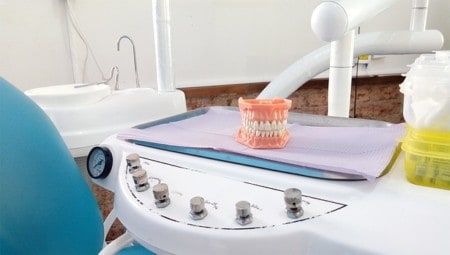
Full denture, prosthetic denture – Information about dentures
A full denture is a removable prosthetic tooth replacement that is used when a full row of teeth is lost in the upper or lower jaw.
Through a possible relining, the denture can be adapted to all changes in the jaw area and stabilized in its hold.
Differences between full dentures and other dentures
In contrast to the bar or clamp prosthesis as well as the telescopic prosthesis, complete dentures do not require any teeth in the jaw to be fixed in place.
The denture comes with an adhesive shell that is responsible for the necessary negative pressure between the palate and the denture. The adhesive shell must be precisely adapted to the jaw, as any unevenness promotes air entrapment and thus leads to wobbling of the denture.
In the case of an edentulous jaw, full dentures are the best and simplest restoration, since their use does not require the placement of an implant or the creation of an artificial tooth to hold them in place.
Materials for a full denture
Full dentures are made of sturdy plastic and can have metal added for a stronger hold and more stability. If a ceramic-based denture is desired, the bonding shell itself is made of acrylic, while the teeth of the denture are made of ceramics.
Thanks to modern technology, the choice of material is no longer a question of appearance, but only affects the cost factor of dentures.
While the full denture is covered by health insurance, the patient pays extra for ceramics or special material requests. For patients who smoke, as well as consume coffee and tea in larger quantities, the orientation to ceramic or zirconium can be optimal and protect against discoloration of the teeth.
Apart from the material, proper care of the denture is also an important part of enjoying it for a long time.
What do full dentures cost?
The cost of full dentures made of acrylic varies based on the different fees charged by the dentist and laboratory. Here are some “key data” to which you can adhere:
- The total cost, including all dental services and the fabrication of a denture in the laboratory, averages 1.300 Euro per jaw.
- Of this, the patient bears a personal contribution of between 600 and 800 euros, while the basic service rate is covered by health insurance.
- The amount of the co-payment depends on various factors and is influenced, among other things, by the carefully kept bonus book for patients with health insurance.
- Further the own contribution can be lowered, has the patient a tooth auxiliary insurance.
Full dentures are usually the most favorable prosthetic care in case of complete tooth loss.
How well does a full denture last as a dental prosthesis??
Denture retention is primarily dependent on the accuracy of the impression. A precise impression with a detailed replica of the palate increases denture retention and prevents loosening, even under heavy loads.
To avoid air pockets between the full denture and the palate, a special gel, colloquially known as bonding cream, is placed between the palate and the denture.
Due to the subsequent contact pressure, the air under the full denture escapes and the hold is so strong that the denture cannot come loose without manual intervention. With a custom-fit full denture, the strong hold in the upper jaw and lower jaw is guaranteed.
Advantages and disadvantages
Patients with complete tooth loss have only limited options in the decision for dentures when focusing on cost coverage.
The advantages of full denture restorations are based on the cost factor, high-quality fabrication and precise retention when properly adapted to the patient’s palate.
Unfortunately, one of the disadvantages is the fact that the prosthesis usually has to be removed overnight. Also an occasional relining can become necessary, forms back the jawbone.
In most cases, health insurance covers these costs, which means that full dentures are not at a disadvantage in terms of price and performance.






